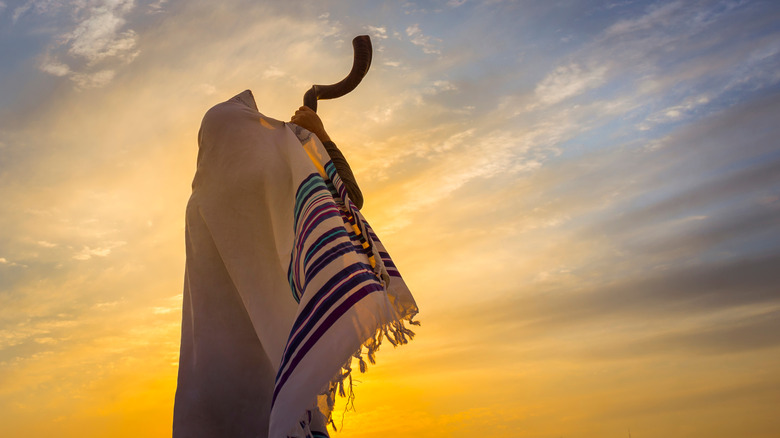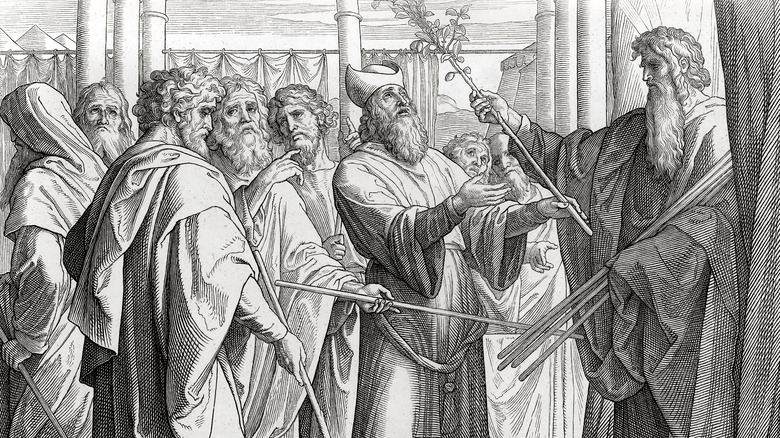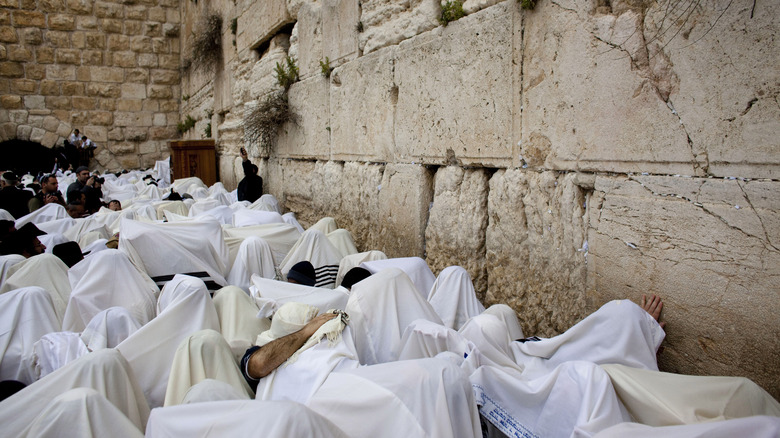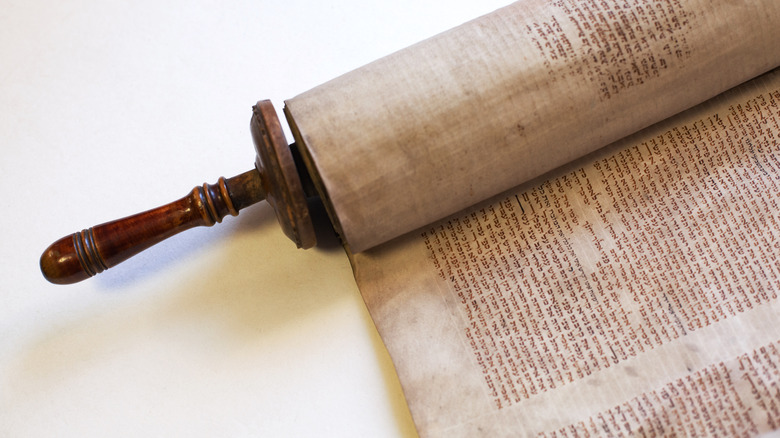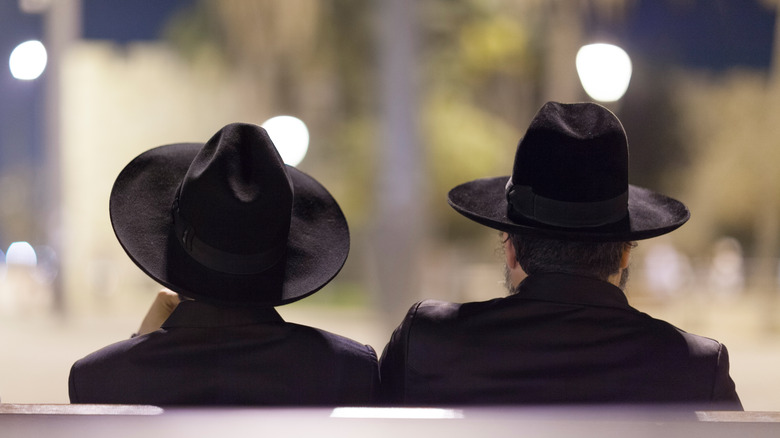The Long History Behind The Name Cohen
Leonard. Sacha Baron. The Brothers. If we can be sure of one thing, it's that there are lots of famous Cohens in the world. Or Coens, Kahns, Cohans — take your pick; the last name has undergone a lot of permutations throughout the centuries. But if we're going all the way back to its properly spelled Jewish roots: Kohan and the plural, Kohanim.
The surname Kohan does indeed go a long way back, not only to Biblical times but also to one of the most important episodes in all of Jewish history: the exodus from Egypt. At the time, enslaved Jews were composed of 12 tribes after the 12 sons of the Jewish patriarch Jacob (per the Jewish Virtual Library). The Levis were the smallest tribe, without as much manpower as the others. And so, they were given leave by the Egyptian pharaoh (possibly Ramses II, via National Geographic) to act as their people's spiritual leaders rather than engage in manual labor. This key decision rippled forward all the way to the present.
When the Jews escaped Egypt and were led by Moses and his brother Aaron to the promised land of Canaan — a familiar story from the Biblical Book of Exodus — the Levis wound up carrying on the same spiritual role, but in a more official, appointed capacity. They, it was believed, had stayed loyal to God in Egypt (via Chabad). And within their tribe, the descendants of Aaron, the Kohanim, passed along their moniker.
Descendants of Aaron
We can pinpoint the origins of the last name Kohan to the Old Testament, specifically Numbers 17: 8-9, in the fifth book of the Torah. As Bible Gateway quotes: "The next day Moses entered the tent and saw that Aaron's staff, which represented the tribe of Levi, had not only sprouted but had budded, blossomed and produced almonds. Then Moses brought out all the staffs from the Lord's presence to all the Israelites. They looked at them, and each of the leaders took his own staff."
The budding of almonds on Aaron's staff — sometimes called the "founding rod" — was considered a miraculous event because almonds don't typically sprout overnight (it takes five to 12 years, via Blue Diamond). Aaron had acted as Moses' speaker when communicating with the Egyptian pharaoh, and the tale recounted in Numbers illustrates how Aaron's tribe and descendants were blessed, more or less, to act in a priestly capacity for the rest of the Jewish people.
That moment produced Judaism's three-way, still-existent lineage, as the Jewish Virtual Library explains: Kohanim (those who trace their lineage directly back to Aaron himself), Leviim (those of Judaism's hereditary priestly class and tribe, also called Levis and Levites), and Yisraelim (all others of Jewish descent or those who convert to Judaism, from where we get the names Israel and Israelite). To this day, some Jewish communities keep painstaking records of lines supposedly stretching back to Aaron to demonstrate the authenticity of their rabbis.
Priestly duties
As the Jewish Virtual Library explains, we have the Golden Calf incident at Mt. Sinai to thank for solidifying the role and duties of Leviim and Kohanim. As Exodus 32 describes on Bible Gateway, the Jews peer pressured Aaron into helping them make a golden calf while Moses was away on Mt. Sinai. When Moses returned, he was furious at the affront to God, chucked the original 10 commandments on the ground, broke them, and ordered the Leviim to kill a whole bunch of those who'd helped make the calf. Three-thousand dead later, Moses said to the Leviim, "Today you have set yourselves apart for the Lord. For each man has been against his son and against his brother, so the Lord may bring good to you today."
This is when the duties of the Leviim and Kohanim started to become standardized, as Chabad says. The Leviim were put in charge of carrying the mishkan (tabernacle) through the desert and later serving in the Solomon's Temple in Jerusalem. They also took up the additional duty of preaching from the Torah. The Kohanim, on the other hand, were revered even more (despite Aaron, their progenitor, caving to peer pressure). During the Jewish exodus, they accompanied the tabernacle while singing and dancing. In Jerusalem, they had unique duties in Solomon's Temple, including offering incense, bringing sacrifices, and lighting the menorah. They also wore special ritually purified clothing, and they themselves also had to remain ritually clean.
Staying the same while changing
There are some Jewish scholars who adopt a literalist perspective when accounting for Biblical time, such as Chabad co-director Chani Benjaminson. For the rest of us, it's difficult to say exactly how long ago certain events in Bible occurred, including the Jewish exodus. We can, however, say that the celebration of Passover, associated with the exodus, dates back to the 5th century B.C.E., as World History explains. This being the case, it would follow that the last name Kohan — a descriptor of the descendants of Aaron dated to the exodus — at least goes back to around that same time.
And as recently as 2022, Jews in Jerusalem celebrating Passover — or Pesach — recite the Kohanim prayer at the Western Wall, the final remnant of Jerusalem's Second Temple built during the reign of Herod Agrippa (37 B.C.E. to 4 C.E.), as Thought Co. recounts. As The Times of Israel describes, members of the Kohanim invoke a benediction and raise their hands to state the prayer while those in attendance cover their heads in shawls. But of course, there are always disagreements when it comes to theology. Kohanim take on a very different role to Reform Jews, those of more secular, less exacting beliefs dating back to 19th-century Germany, as My Jewish Learning discusses. Reform Jews, as the Jewish Virtual Library says, don't believe in the necessity of any distinction between traditional Jewish classes and their roles, including Kohanim.
Spread around the globe
Tragically enough, we have violence against Jewish people to thank for the current dissemination of the surname Kohan around the world. As My Jewish Learning describes, the first crusade, launched in 1096 by Pope Urban II, inadvertently spread Judaism and its people throughout Western and Eastern Europe. In short, Christians marshaling for their march on Jerusalem targeted any and every non-Christian they could along the way, including Jews in the Rhineland in modern-day Germany. Jewish communities were destroyed, and survivors fled. These survivors, Ashkenazi Jews — Jews of Central and Eastern European origin — had spread out in Europe from Judea in the old Roman Empire, as The Conversation explains.
Jews and their surnames also spread due to the increase in "blood libel" allegations. From the 12th century all the way to the 19th century, Jews suffered the shockingly bizarre and specific accusation that they kidnapped Christian children and sacrificed them, as the Jewish Virtual Library discusses. In the late 15th century, specifically, Jews were expelled from Spain because of such tales and again driven further abroad.
Finally, and perhaps most obviously, hundreds of thousands of Jews managed to escape Germany leading up to World War II. As the Anne Frank House shows, they fled across the globe, from Romania to South Africa, the Netherlands to United States — basically anywhere that would shelter and welcome them. It should go without saying, but this doubtlessly had a huge impact on the proliferation of the Kohanim worldwide.
Genealogical strains
Nowadays, as Chabad says, Kohan (more specifically, it's variant spelling Cohen) is the most common name in all of Israel — almost 160,000 people, as Forebears shows. That's quite the large number of descendants for people claiming to be descended from a single man, Aaron, the brother of Moses. It's even more impressive when you consider that there are an additional 145,000 people with the last name Cohen in the United States. Worldwide, there are over 390,000 people who bear the surname of Judaism's most revered priests.
There are, in fact, tools that people have used — and can use — to investigate the Cohen surname further. As Thought Co. shows, there was an honest-to-goodness DNA-testing project to see if Cohens share genetic markers related to the Kohanim across a 100-generation Jewish lineage. Dr. David Goldstein of the University of Oxford says on Aish that there's a 90% "paternity-certainty" rate for those tested. Or in another word, the test was a "testament to the devotion of the wives of the Cohens over the years. Even a low rate of infidelity would have dramatically lowered the percentage." (Remember that Kohanim were patrilineal, passing along duties from father to son.) There's also the Cohen chat forum on Genealogy, which doesn't look like it's been active for quite some time, but used to be until 10 years ago. In the end, it looks like the unbroken line of Aaron is sure to keep going for quite some time to come.
